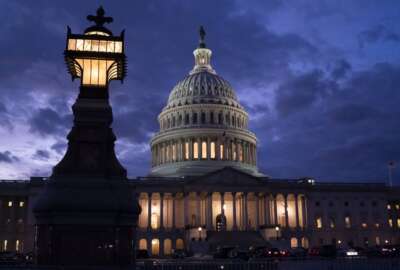It’s a weird time in Congress with a war going on in Europe
Besides the omnibus budget package, Congress is dealing with a few other issues this week, like postal reform. But it's a short week, according to Bloomberg...
Besides the omnibus budget package, Congress is dealing with a few other issues this week, like postal reform. But it’s a short week, as the Federal Drive with Tom Temin learned from Bloomberg Government Deputy News Director Loren Duggan.
Tom Temin: Loren, the omnibus packages that are coming forth to be voted on sometime during this week, presumably to get to the President’s desk, they have to finish those votes this week before they go on recess. So tell us what the schedule for that would look like.
Loren Duggan: Right. So this omnibus package is going to be the top priority in the House and the Senate this week, trying to fund the government for fiscal 2022, which, as we know, started Oct. 1, but there have been delays over time, and everything has been operating under a continuing resolution. So it may be a heavy lift to get this through both chambers by Friday night at midnight, going into Saturday. So the House and Senate leadership are going to be working their members, trying to figure out the way to get this through as they digest everything that’s in a package that covers every agency in the federal government that’s covered by appropriations. So the House will likely go first, because their week is truncated. As you mentioned, they’re only here through about Wednesday afternoon. And then all of the Democrats are headed up to Philadelphia for their annual retreat, which is the first one, by the way, they’ve done in-person in a long time. And hopefully for them, they’ll have this feather in their cap of passing a government funding package. It would then go over to the Senate where as we know, things can happen really quickly or they can be dragged out. So one of the goals in the House will be to get this over to them with enough time in the Senate to process it, get over any procedural hurdles, and try to get it to [President Joe] Biden by the end of Friday, so he can keep the government open in the weekend.
Tom Temin: All right. So House Democrats would rather be in Philadelphia. What are the Republicans doing while the Democrats are in Philadelphia? Do they go to Florida or something?
Loren Duggan: They may go there. But often they’ll go back home and meet with their constituents and do the normal work there. The parties do this. It’s a tradition for them to take a break at some point early in the year to go and do some planning for the rest of the year. The Democrats had hoped to do this in February, [but] postponed it because of COVID. And now they’re getting really together in person and doing this for the first time. So we’ll see what comes out of that, if they have any bold announcements that they’ll want to make. On the Senate side, they are taking Wednesday off to do a similar thing. The Senate Democrats and the Senate Republicans will meet separately in town. They’ll be back then for votes on Thursday, presumably, and probably dealing with this omnibus package still, just based on how much time it can take to process it.
Tom Temin: Got it. And one of the things in the State of the Union speech that got a lot of play by the President was still pushing the Build Back Better business. Would that be perhaps part of the Democratic agenda, that Build Back Better bill? Or do you think they spend their time figuring out how to make sure they get reelected a few months from now?
Loren Duggan: I’ve long maintained that the idea of a budget reconciliation bill, which is the process they were trying to use to push Build Back Better, remains alive, because it’s a vehicle that you only need 50 votes to get through the Senate. So maybe it’s not the broad sweeping, as-it-was out of the House, $1.75 trillion spending package that had some offsets. But maybe there’s a smaller menu of things that Democrats can pull out of that, whether it’s the climate change provisions, or some of the family-oriented things that the President talked about, like child care payments or additional child tax credit, something like that. If they can find a package of spending or tax credits that are money going out, rather than bringing money in, and then also have enough offsets to make it a package that somebody like Joe Manchin is happy with, maybe with some deficit reduction as well as offsetting some of the new spending or new initiatives that are in there, there may be a path forward for something. Whether they call it build Back Better or calling it — I forget, he used a phrase like Building for America or something in his speech like that. So elements of this remain alive. They talked about chunking it up at the end of last year going into this year. So I think the Democrats will talk, see what they can do. The House Democrats have already done their part, as far as they’re concerned. It’s what can get through the Senate, what can get 50 Democrats plus Kamala Harris on board. So I think that agenda is alive. But that may not happen this week. Maybe a couple of weeks or even months into the future.
Tom Temin: We are speaking with Loren Duggan, deputy news director at Bloomberg Government. And what about the postal reform, because that seemed promising, that it would finally get pushed over the line? What’s the status there?
Loren Duggan: It could go over the line this week. There’s been a lot of bipartisanship for that in both chambers. The House passed a bill, sent it over. There was a little hiccup on the technical side that kept the Senate from doing it before they went on a recess recently. But they’re doing a cloture vote tonight. If they can get 60 senators for that it’ll be teed up for a vote on final passage. Provided there’s no changes between now and that passage vote, it would head to the President’s desk. And this would be a pretty significant change for the post office. A lot of it deals with this pre-funding requirement they’ve had for healthcare and shifting away from that, and also allowing them to do some additional things to raise revenue. So it is a rare piece of bipartisan legislation. That’s a pretty big deal. It’s not universally supported, because if it were they wouldn’t have needed all these cloture votes and procedural steps. But I think there could be a win here for folks who have looked to fix the Postal Service or elements of it for a long time.
Tom Temin: All right. I wanted to ask you, there’s been a lot of talk, certainly the war in Ukraine focused a lot of people in Congress on that, and there was demonstrations of that during the State of the Union. Is there anything Congress will be preoccupied with? Otherwise, it’s doesn’t sound like there’s a lot they can do. Because obviously, the United States is not at war, and is not planning to declare war there.
Loren Duggan: Well, they are wing and had to weigh this request from the administration for $10 billion to use to help with operations. As the President made clear, he’s not sending troops into Ukraine, but he is thinking about what do we do to shore up other parts of Europe, where we do have alliances — particularly NATO — and guarantees. If there’s an invasion of a NATO country, we are supposed to come to the rescue there and be part of any sort of military action there. So they will be looking at that; they will undoubtedly be thinking more about sanctions. They had talked about sanctions legislation before the invasion. Now that it’s happened, they could be looking at that again. The administration obviously has a lot of powers it’s already used to sanction government institutions and individuals in Russia, but I wouldn’t be surprised that there’s still a push to do more on that front: hold hearings, see what’s happened. So Ukraine is going to remain in the headlines. And it’s also going to remain top of mind for Congress. There’s also a lot of talk right now about China and what to do there and concerns about Taiwan. So I wouldn’t be surprised if we kept hearing more about that. There’s legislation pending to deal with competition with China. So foreign policy is in the minds of a lot of people in Congress as they weigh all this domestic stuff as well, like government spending and things like the Build Back Better reconciliation package.
Tom Temin: Also, just before the State of the Union, the President got some nominees through the Senate. It was kind of an odd, late-minute vote and they put it out on Twitter and the cloakroom account. Strange, but there were two assistant Defense Secretaries, there were two members of the Merit Systems Protection Board — third one to-go; that one’s in limbo — and a few others. Will there be more of that? Do you think some more quick confirmation votes to get some of these nominations cleared?
Loren Duggan: They’re always chipping away at this. It’s often what feels time on the floor when they’re waiting for other things like an omnibus to come over. This week, we might see a deputy U.S. trade representative confirmed, and we may see the head of ICE — Immigration and Customs Enforcement — go through. So that’s on the floor side. And then the hearings are continuing in committees and markups as well of those nominations. Some of the higher profile ones have been held up; if you’ve been paying attention to the Fed nominees, both Chairman [Jerome] Powell for another term as chairman and then other members of the Board of Governors, those have been stuck because Republicans have boycotted the votes, and nothing can happen if you don’t have a majority of the members. So in evenly split committees that’s tied things up. But if they can get those moving, I would see those coming to the floor for a vote soon. And then obviously the marquee nomination right now and the one that the President talked about, as well in the State of the Union is the Supreme Court nominee who started meeting with senators last week. [She] will continue that and head for a hearing and then presumably a markup and floor vote. So nominees are always present, maybe under the surface, and some of them pop up and get confirmed when you least expect it, when these deals open up, especially as events warrant, so that’s always something on our radar.
Tom Temin: Loren Duggan is deputy news director at Bloomberg Government.
Copyright © 2025 Federal News Network. All rights reserved. This website is not intended for users located within the European Economic Area.
Tom Temin is host of the Federal Drive and has been providing insight on federal technology and management issues for more than 30 years.
Follow @tteminWFED






